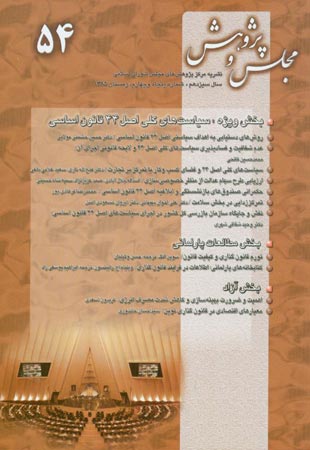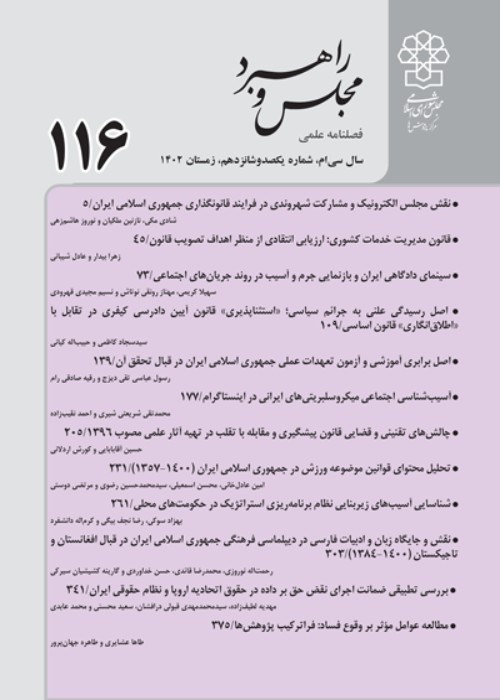فهرست مطالب

فصلنامه مجلس و راهبرد
پیاپی 54 (زمستان 1386)
- تاریخ انتشار: 1386/04/11
- تعداد عناوین: 11
- بخش ویژه - سیاست های کلی اصل 44 قانون اساسی
-
صفحه 155
- بخش مطالعات پارلمانی
-
صفحه 191
- بخش آزاد
-
صفحه 279
-
Page 11To strengthen private sector in its interactions with other countries as well as to become a member of World Trade Organization require privatization of some sectors of the economy. The required capacity for achieving this goal should be provided. Given decrease in the state's economic activities and change in the state's responsibility in relation with economic firms, it can be said that the state's opportunities for pursuing such strategic issues as efficiency,productivities, and efficacy of firms will be increased. Considering the lack of sufficient control over private enterprises, it may be asked that how one cannot expect that extension of private firm's activities lead to corruption. The answer is so simple. Governmental control can be improved through presence and strengthen of private sector's activities and, considering that the private sector has had least productivity in previous years, public sector has had minimum productivity as well. It can be expected that control sector gradually will be developed through development of private sector. Obviously, with development of control sector, governmental and nongovernmental firms and banks will be compelled to observe financial standards as well as to make decrease in unnecessary costs.Keywords: justice stocks, auction, giving, out, sourcing, black stock
-
Page 37The economic and financial corruption which is usually the same everywhere has its origin in governmental corruption. One of the most important sources of corruption is rent, and one of the most important sources of rent is privatization. Iran is a rent-based country with all its characteristics. The Supreme Leader has emphasizes on increase in both national wealth and social justice in goals of general policies of article 44, but these policies and legal bill on Article 44 suffer from corruption-prone and the lack of transparency, which are to be studied in this paper.Keywords: financial corruption, governmental corruption, privatization
-
Page 73In order to achieve economic growth and development, given the dominant climate following the victory of Islamic Revolution, Article 44 of the Iranian Constitution has divided the economic system of the country into three sectors of public, cooperative and private. The rapid and wide economic changes in last decades and the experience with performance of the existing economic system have paved the way for reconsidering in the economic system of the country with emphasis on one of the general policies.Due to situations produced by a state-oriented economic system,productivity in both public and private sectors has substantially subsided. That is why privatization may not only be incapable of achieving economic efficiency along with social justice but also give rise to increase in economic growth, without considering its requirements. Thus, it is impossible to achieve the goals of general policies of Article 44 through focusing on privatization. To be able to do so, the key factor is empowering private and cooperative sectors as well as developing business climate with use of wide, easy, and increasing interactions in economic sectors.While reviewing various indicators for business climate, this paper concentrates on foreign trade indicator, presenting the reform of business climate as one of requirements for implementing thegeneral policies of Article 44 as well as for achieving the goals of these policies.Keywords: business activity information, business activity indicator, economic growth, private sector, formal economy, doing business database, doing business indicators
-
Page 109One of the goals of privatization is just distribution of wealth, which has been put in the Iranian state's agenda in the form of Justice Stocks Project for supporting low income strata. While reviewing the goals of privatization on the basis of mainstream economic literature as well as of intended goals in the Justice Stocks Project, this paper tries to pose and answer the question if this project can be considered as privatization. The results show that, as far as having simultaneously both efficiency and equity as well as corporate profitably view point as one of the major goals of privatization, this project cannot be considered as privatization.Keywords: privatization, justice stocks, equity, efficiency, productivity, management
-
Page 133The experiences of many countries show that public pension schemes or social security projects have been recognized as one of the fundamental socio-economic issues since many years ago. In Iran, the Iranian state is legally responsible for managing financial resources of Social Security Organization and other public pension funds. Of course, until several decades ago the pension funds gave pensioners moneys received from policyholders but nowadays,considering changes made in demographical trend and retiredpolicyholder ratio, the issue of investing pension fund's financial resources as well as of methods for providing incomes for retired in retirement period has become one of the most important challenges of these pension funds. While studying the before-mentioned issue and other issues related to Iranian pension fund's investments mentioned in notification of Article 44 of the Iranian Constitution for determining the maximum investment for pension funds, this paper reviews some good experiences of such countries as Canada, Ireland, and Norway in pension fund's investments as well as in designing a proper governance structure for these funds. This paper also suggestssome solutions for accountability, ransparency, and honesty in pension funds in order to achieve social security goals as well as to try safeguarding interested partie's interests in pension funds and managing their own moneys in Iran.Keywords: pension funds, social security, corporate governance, accountability, transparency, honesty, investment policy
-
Page 155Like other public sector services, health services have serious problems including technical inefficiency. Among other problems this sector has, one can mention undesired use of allocated resources.Inefficiency is also considered as another problem. Many governments have tried to more or less decentralize health sector in order to solve these problems. These reforms in organization of health services paved the way for substantial changes in approaches to the proper role to be played by governments in health issue. But decentralization and privatization in health sector has been beginner of debates between supporters and opponents of this issue. Today there are valuable experiences in this regard from which we can use. In Iran, decentralization in health sector has been noticed in the third and fourth development plans whose experiences can be reconsidered. It is obvious that there are multiple combinations of private and public between two extreme cases of private and public organizations, which can be a proper formula for supplying health and care services in Iran. Apart from this fact that how policies of Article 44 cover the health sector, this paper tries to review privatization of health services in the world, studying the existing opportunities and threats in this sector through emphasizing on Iranian context.Keywords: decentralization, health systems, privatization
-
Page 171With making the general policies of the country as well as the Twenty-year Perspective Document and in order to accelerate economic growth, the general policies of the Article 44 of the Constitution of the Islamic Republic of Iran were notified in 1384 by the Supreme Leader. The researches show that General Inspection Organization as a controlling organization, according to the article 174 of the constitution, is responsible for controlling proper, up-todate,and non-discriminatory implementation of the policies. That is why this organization should put planning for and concentration on implementation of the policies in its agenda.Keywords: General Inspection Organization, general policies of Article 44 of the Constitution of Iran, supervision, control
-
Page 191Legislative inflation or great quantity of law is among the major problems of (post) modern societies. First of all the main causes of the aforementioned problem were analyzed in this article which was presented in the Forth Benelux-Scandinavian Symposium on legal theory. The author discuses whether the ''bad legislation'' is among the significant causes of the great legislative quantity. What is the meaning of the ''bad legislation?'' Answering to this question he examines substantial flaws, technical and means-end flaws of the legislation. Substantial flaws are considered on the basis of several sets of the criteria consists of moral, political, legal criteria and practical disharmony. Technical flaws including logical inconsistencies, difficult language and too casuistic or determinate legislation or too general indeterminate or discretionary legislation are examined in next part. At the end the author analyzed the role of the means-end flaws in legislative inflation which means the failure of the legislature to reach to his values based goals by adopting the laws and regulations as means. In conclusion author emphasizes on the importance of the '' legal definition'' and states that this approach is very helpful for managing the problem of legislative inflation.Keywords: Parliament, Legislative inflation, Bad legislation, Substantial flaws, Technical flaws, Means, end flaws, Alternative techniques of legislation
-
Page 211This essay begins with a theoretical analysis of the actual or potential roles of parliamentary libraries: helping the legislature to carry out it's activities in an informed manner and thereby enhancing legislative participation in the policy-making process. Depending on the role that information can play in the process of policy-making in the country, we can identify four levels at which a parliament might function: rubber stamp, emerging, informed and transformative. Each political system must decide what level of legislative activity is most appropriate for it's purposes, based on the structure of governance, political traditions, values and goals, and economic realities. Essay continues with emphasize on the role of parliamentary library as a transmitter, interpreter, and the synthesizer of information for the parliament. It then provides a more descriptive presentation of the rich variation in parliamentary libraries around the world (in terms of history, setting, staff, collections, and services). It concludes with a discussion of issues and trends that portend the patterns of the libraries and research services centers for parliaments in the future.Keywords: Parliamentary libraries, Legislature, Information services, Research services, Members of parliament
-
Page 253In human societies, energy has a significant role, and it has been used in different ways in any phase of human history. The statistics show that the dependence of the world on nonrenewable resources will not be declined in the future years. This situation has motivated industrial countries to adopt optimization energy consumption policy since some years ago. In general, those countries owing natural resources also have to put optimization policies in their economic and energy policies in order to achieve their own maximum utility or national interests. Therefore, the adoption those policies influencing both demand and supply sides of energy is a non-deniable reality.Keywords: optimization, energy intensify, energy consumption, energy production


